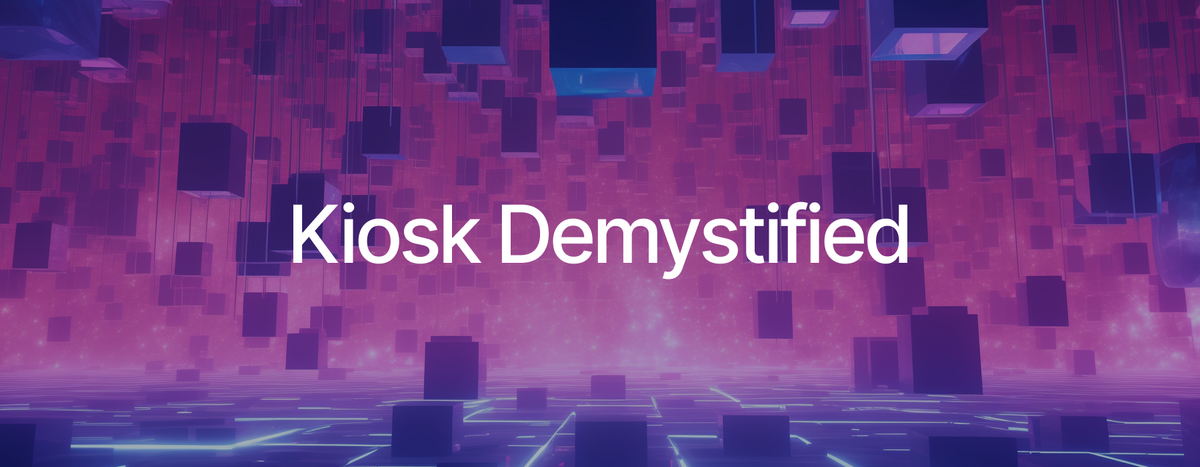Sui Kiosk Demystified: Revolutionizing Digital Asset Transfers
Sui's Kiosk primitive enables secure asset transfers with greater control.

The occasionally adversarial world of blockchain technology makes safeguarding and exchanging digital assets crucial. Sui's Kiosk, a powerful primitive revolutionizing the storage, trading, and protection of digital assets, gives asset creators and owners security and control. Sui Kiosk can be compared to an escrow service, particularly in its role as a mediator or custodian for transactions involving digital assets. Both Sui Kiosk and traditional escrow services provide a mechanism for securing assets during a transaction until specific conditions are met.
Understanding the basics
At its core, a Kiosk is an object owned by an individual wishing to trade an asset, such as an NFT, serving as a location for storing digital assets to be sold securely on the Sui network. The individual selling the asset retains administrative control over the Kiosk and the objects within it. Digital assets stored within a Kiosk, while technically owned by the Kiosk object, can continue to be used in certain interactions, such as being deposited in specific DeFi apps, until the object is purchased from the Kiosk.
Features and functionality
One of the key features of a Kiosk is its ability to allow the owner to set specific permissions for accessing the assets they are selling. For example, an owner may dictate that an object within the Kiosk can only be accessed by individuals willing to pay 100 SUI. This is a simple example of what abilities Sui Kiosk enables for the trading of digital assets.
End users require no additional knowledge or tools to interact with a Kiosk. Much like other Sui primitives, such as programmable transaction blocks, users do not need to be conscious of Sui Kiosk when using it.
For developers integrating Sui Kiosk, the process is streamlined and straightforward because it's native to the protocol. Dedicated functions are available for creating a Kiosk, adding objects to it, and listing items for sale, alongside other more specific functions. Those interested in delving deeper into implementing Sui Kiosk or understanding its workings can refer to the Sui Kiosk docs.
Empowering creators
For creators, Sui Kiosk offers robust enforcement mechanisms for transfer policies, safeguarding their assets and asserting ownership rights. Creators have the authority to establish transfer policies tailored to their specific needs, thereby exerting greater control over how their creations are utilized within the Sui ecosystem.
The transfer policy of an object is established by the account that publishes that particular object type. For example, if you, as a creator, publish a smart contract on Sui to introduce a new object type for your in-game item, you have the authority to define the transfer policy applicable to all objects of that type. Users engaging in the trading of these objects through Sui Kiosk must comply with the transfer policy. However, they can further specify criteria, such as a designated purchase price, using a kiosk as long as it aligns with the boundaries set by the transfer policy.
Furthermore, Sui Kiosk empowers creators to enforce a wide range of behaviors on any type of asset, including but not limited to multiple royalty policies, minimum or maximum trading thresholds, exclusive marketplace sales, and time-bound trading windows. This versatility ensures that creators can protect their intellectual property, effectively regulate distribution, and establish unique asset properties related to transfers specific to their creations.
Enhanced security and trust
One of the most significant advantages of Sui Kiosk is its inherent security features, which mitigate the risk of unauthorized access and potential exploits. By leveraging native ownership and transfer functionalities, the Sui Kiosk standard ensures that digital assets are protected against malicious activities, including wallet drain attacks and other unauthorized transfers.
As previously mentioned, Sui Kiosk acts similarly to an escrow service, providing users with confidence that their assets are secure and inaccessible to malicious actors who don't meet the Kiosk criteria. Additionally, this setup creates a separation between the trade and the Kiosk creator's other assets.
Token approvals, typically used on conventional blockchains, often entail significant security risks and vulnerabilities and can lead to wallet drain attacks and similar threats. These approvals typically entail granting unlimited access, making them susceptible to exploitation by malicious contracts or individuals exploiting bugs in innocent contracts. Moreover, such approvals can be exploited at any point between approval and explicit revocation.
Major Sui marketplaces built on top of the Sui Kiosk standard provide users with a seamless and secure trading experience. Software development kits, wallets, and blockchain explorers are equipped to interface with the Sui Kiosk standard, thereby enhancing interoperability and trust across the ecosystem.
Secure digital asset ownership for all
By adopting Sui Kiosk, users unlock trust, transparency, and efficiency in the world of digital asset management. With its strong security measures, customizable policies, and seamless integration with marketplaces, Sui Kiosk empowers all personas within the ecosystem.
Sui Kiosk represents a pioneering solution to the challenges of asset ownership and exchange in decentralized ecosystems. Its adoption not only enhances security and trust but also fosters a more dynamic and inclusive environment for creators, traders, and enthusiasts alike.
Note: This content is for general educational and informational purposes only and should not be construed or relied upon as an endorsement or recommendation to buy, sell, or hold any asset, investment or financial product and does not constitute financial, legal, or tax advice.



